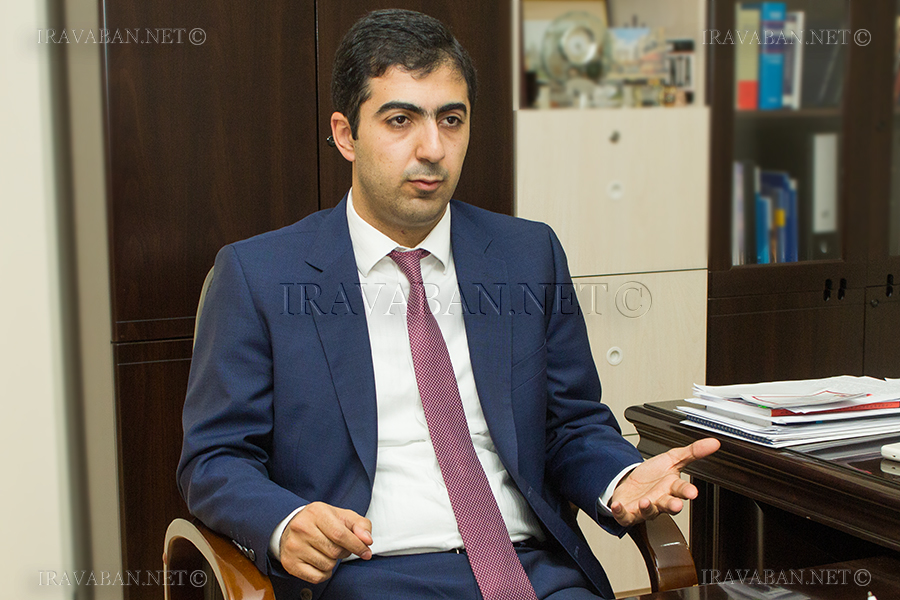The Ministry of Justice has developed a Draft Law “On Making Amendments and Addenda to the Law on Advocacy” within the framework of the strategic direction of the reform of advocacy sector. It has not yet been submitted for public discussion, but was sent to the Chamber of Advocates and all acting advocates for collection of preliminary opinions. Iravaban.net has started a series of interviews, which aims to present the observations and opinions of the advocacy community on the proposed changes.
We talked about the topic with Mr. Aram Orbelyan, a member of the Chamber of Advocates.
– In your opinion, what is the objective for implementing such changes?
– In any field, no matter it is advocacy, the judiciary, or the sectors of the economy may always need change. That is, there is always better than the best. The question is whether there is a priority to make legislative changes in the field of advocacy today and and whether the non-implementation of these legislative changes hinders the development of the field to such an extent that we should focus on the development of legislation in the field of advocacy, leaving aside the other issues. Why do I say this? Because when we talk about public administration, we have to understand that we are always talking about limited resources. In the face of limited resources, one should always prefer the areas where the changes will have a more significant impact on the changes in the development of relevant public relations.
I think there are not such deep legislative issues in the field of advocacy, and there is no need to make any fundamental changes. But that does not mean that all the proposed changes are bad. In other words, it is not that they wrote something bad. There are some changes in the draft, which I think at this stage can have a positive impact on our system. But there are also changes that I personally assess negatively, and there are others that are difficult to assess what effect they will have at the moment.
– One of the proposed changes refers to the review of the role of the Board of the Chamber of Advocates and the Chairman of the Chamber in the executive management relations of the Chamber of Advocates, giving priority to collegial management. How do you feel about this proposed change?
– Management of corporate or non-profit organizations and state government are different structures. They differ in their role, structure and functions. Therefore, when looking at the governing bodies of the Chamber of Advocates, we must understand that it is the self-governing body of the Advocates. he self-governing body of advocates will have a staff of advocates and non-advocates who should do the work and there should be a collegial body that will make decisions.
We see the formation of several collegial bodies and some other processes in the draft. There are currently a little over 3,000 advocates in Armenia. It is quite a well-established structure, but it is not a “super giant”, for example, a structure with 50,000 members, and the formation of a complex management system will be complicated, because it is necessary to find the right number of people who want to do it and put resources to engage in activities. Being a member of the Board, for example, is usually on a voluntary basis. We need to understand that this structure is self-financing, and the increase of the apparatus leads to an increase of expenses, if they are paid and not on a public basis. Therefore, as long as there is not a large enough structure, that is, when we will have 20 thousand lawyers, then the need for complex systems and the development of more complex management models can already be discussed. At this stage, in my opinion, the current model meets the requirements of today and even tomorrow.
The Republic of Armenia has one of the most developed, if not the most developed, advocacy communities in the region, and, speaking in quotes, can compete with a number of Western European chambers in terms of its level of development. Therefore, I do not think it is necessary to change or complicate anything in-depth here, and it will lead to the disruption of the formed or emerging relations. It will become not a body of self-government, but a body of internal struggle. There may be attempts to politicize it, to make it political, not party affiliated, but a participant in some processes. It’s not necessary: It is a self-governing body and has its own position on legal issues.
– One of the proposals for changes refers to the possibility that the Public Defender’s Office will be able to organize public protection of persons through other persons who are not public defenders. Will the change be appropriate?
– It is a slightly in-depth problem. The public defender’s office is a fairly well-established model today, but there is room for improvement in the sense that the public defenders are overloaded today. That is, the numbers of cases that come to the Chamber of Advocates and for which the state pays are disproportionate. This is approximately the principle: we have 70 public defenders, there will be 1000 cases, and we have to deal with 2000 or 3000 cases. Back in 2011-2014, some initial attempts were made to switch to program budgeting in all judicial and justice systems. The process has started, but has not yet been established.
For example, if the Public Defender’s Office finances private advocates and they do the work, the method may work, but we need to understand how financially viable it will be and how much it will increase prices. In this respect, it is possible that there is a more effective model. In my opinion, increasing the number of public defenders and normal program budgeting will bring a general solution to the issue, which does not exclude the possibility of involving external non-public defenders. But here the administration will be quite complicated in this case. There is a fairly experienced team in the Public Defender’s Office today, and it is not a question of age, but of experience and skills. Since, for about 10 years, the defenders are accepted through a competition, the salary is not bad and they generally provide good quality services. If there is a generalization, the idea may seem interesting, but at least I do not see a real model for its evaluation. While not excluding the positive quality of action, however there should be a very clear description of the financial and managerial model, which does not exist.
– Mr. Orbelyan, which of the other changes proposed by the Ministry of Justice are problematic and what are the risks on the way to their implementation?
– Conditional broad separation of the governing system, setting some rules, raising issues that, in my opinion, are not realistic, forming several bodies other than the Board, restricting the formation of those bodies, allowing members of the chamber to work or not to work in the chamber, and a number of other things, in my opinion, are ideas that have not undergone real approbation. In my opinion, at this stage, making such changes in connection with an established institution like the Chamber of Advocates is very risky.
– How do the advocates perceive the proposed changes? Do you associate them with the results of the recent election of the Chairman of the Chamber?
– As an optimistic person, I do not want to see connections in that direction. I see this issue more in the light of the efficiency of public administration, because I see a problem in the light of the institutions of proper and appropriate use of resources, which are established or are being established in the light of supporting or not supporting.
At the same time, I do not rule out that there are certain legislative or other issues, but they are not at the level that needs to be addressed today. It is also very important that the changes are within the framework of evidence-based reform. That is, when we make big changes in a system, its financial and economic model must also be understood: that is ‘who, how, when and why’ should do it? Against the background of discussing this issue and putting it on the agenda today, I see some problems, because the resources should be concentrated in the areas where there is a need for real change. I think that the draft of these changes should not have been developed, but not because it is bad, right or wrong, but because there are other areas that need to be analyzed, researched and changed more specifically. If I evaluate in general, I’m more against the proposed changes than for them.
Meri Mnoyan


















